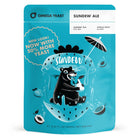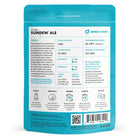Product Details
Omega Yeast OYL-401 Sundew's ripe strawberry, passion fruit, pear, and stone fruit combine to emphasize desirable notes in modern fruity hops. This Omega Yeast exclusive strain was inspired by its parental strain's fruity esters, which were originally obscured by Belgian phenolic character. Sundew™, however, is non-phenolic and incapable of producing the spicy clove flavors that were previously competing with its pure, juicy red-fruit bouquet.
Yeast Characteristics:
- Temp Range: 65 - 78°F
- Attenuation: 72 - 85%
- Flocculation: High
- Alcohol Tolerance: 12%
- Non-Phenolic (POF-)
Recommended styles and recipe kits to highlight Sundew's ripe strawberry esters :
- Pale Ale - Zombie Dirt Pale Ale
- Blonde Ale - Cashmere Blonde Ale
- NEIPA/Hazy IPA - Fruit Bazooka New England IPA
- Milkshake IPA - Hula Hop'd Coconut Milkshake IPA
- Pastry Stout
- Milk Stout - Chocolate Milk Stout
- Dark Mild - Black Magic Dark Mild
- British Bitter - Extra Special Bitter
Learn more about Omega Yeast's POF- Project and their newest strains OYL-400 Bananza and OYL-401 Sundew here:
Additional Information
| SKU | OYL401 |
| Fermentation Type | Ale |
| Yeast Style | NEIPA, IPA, Pale Ale, Hazy IPA, Milkshake IPA, DIPA |
| Yeast Format | Liquid |
| Flocculation | High |
| Min Attenuation | 72% |
| Max Attenuation | 85% |
| Min Fermenting Temp | 65°F |
| Max Fermenting Temp | 78°F |
For some nerdy homebrewing fun we recommend trying a split batch of your favorite recipe with OYL-401 Sundew™ and its phenolic parent yeast OYL-024 Belgian Ale A. The characteristics between the two strains are the same minus the phenolic characters, allowing you to see how the phenolic characters can mask fruity esters. Nerd out even more and try blending the two in the same batch, allowing for more control in how much spicy peppery character in your end product. Below are the recipe kits with Sundew's parental strain OYL-024 Belgian Ale A as a recommended yeast option.
Available only in the US and Canada, while we would love to make these strains available internationally, many countries' regulations do not yet allow the sale of organisms developed using modern gene-editing, regardless of the type of modification introduced by the technique. Therefore, these are available only in the US.




